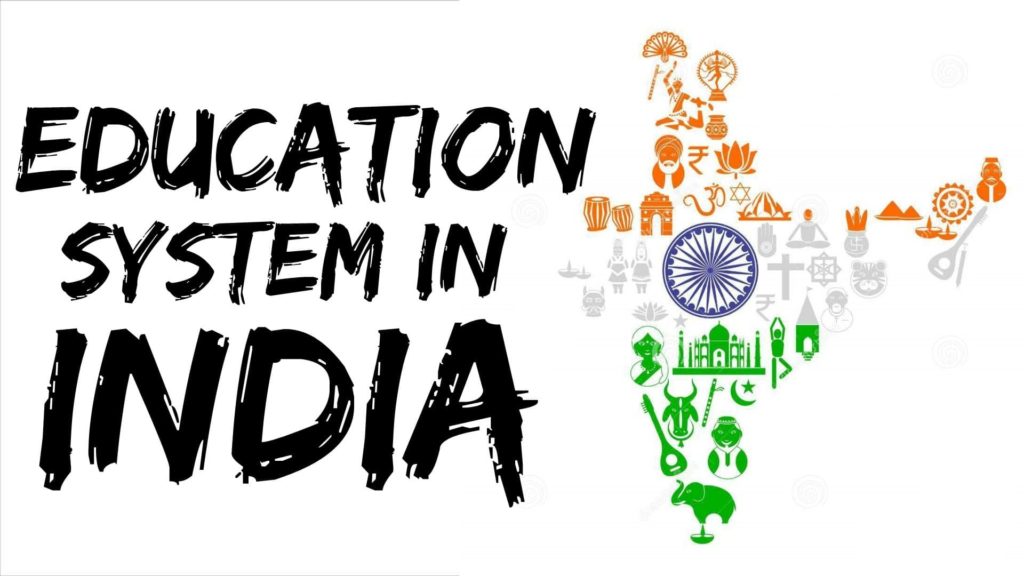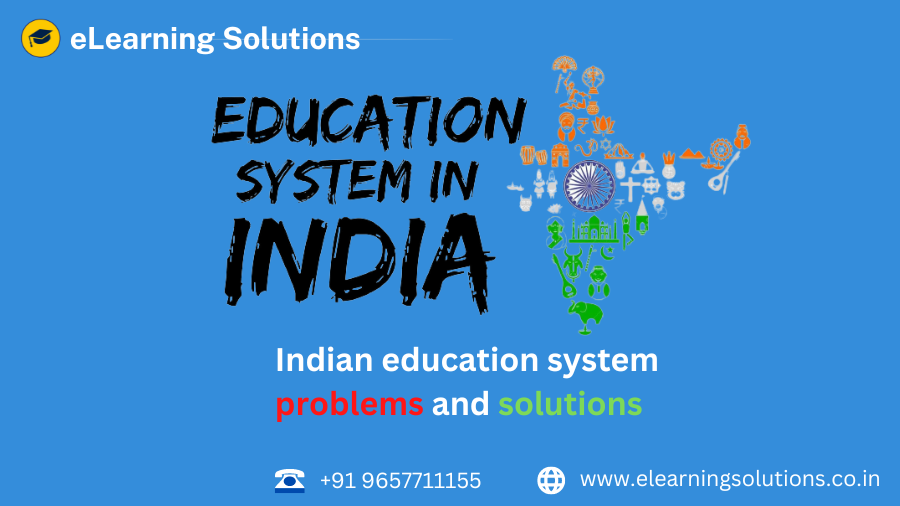Indian education system problems and solutions?Education is the foundation of a nation’s development. In India, education has been given great importance since ancient times, and the country boasts of a rich heritage of learning. However, despite a significant improvement in the education sector, India still faces several challenges in this field. This blog aims to highlight some of the problems of the Indian education system and suggest solutions to address them.

Indian education system problems and solutions : Issues
- System of education: Indian education system problems is heavily focused on rote learning, memorization, and theoretical knowledge. It does not emphasize on practical and skill-based learning, which is required in the current job market.
- Costly higher education: Higher education in India is becoming increasingly expensive, which is leading to a decline in the number of students pursuing higher education.
- Lack of infrastructure: Many schools in India lack basic infrastructure like classrooms, libraries, and laboratories, which affects the quality of education provided.
- Poor global ranking of institutes: Indian institutes lag behind in global rankings, which affects the perception of Indian education abroad.
- Gap between education provided and industry required education: Indian education system problems is not aligned with the needs of the industry, leading to a gap between the education provided and the skills required by the job market.
- Gender issues: Women in India still face significant barriers to education, especially in rural areas.
- Inadequate government funding: The government funding for education in India is insufficient, leading to a lack of resources and facilities in schools.
Indian education system problems

- Adult Illiteracy: Despite significant efforts, adult illiteracy still remains a problem in India.
- Lack of Funds: Many schools and colleges in India do not have sufficient funds to provide quality education.
- Government Apathy: The government has not given enough attention to the education sector, resulting in a lack of resources and facilities in schools and colleges.
- Expensive Higher Education: Higher education in India is becoming increasingly expensive, which is leading to a decline in the number of students pursuing higher education.
- Lack of Seats: Many students are unable to secure admissions in schools and colleges due to a lack of seats.
- The Dearth of Qualified Faculty: The lack of qualified faculty in schools and colleges is affecting the quality of education provided.
- Lack of Native Language Publications: Many students in India do not have access to quality educational material in their native language.
- Theory Based Education: The Indian education system is heavily focused on theoretical knowledge and does not emphasize practical learning.
- Marks Oriented: Indian education system problems is focused on obtaining high marks, rather than on learning.
- Bulk Syllabus: The syllabus in Indian schools and colleges is extensive, which leads to a lack of focus on depth and understanding.
Indian education system problems : How to solve these problems?

- Quality education: The focus should be on providing quality education that is aligned with the needs of the industry and emphasizes practical learning.
- More government spending & Initiatives: The government should increase spending on education and introduce initiatives like Poshan Shakti Nirman, Beti Bachao Beti Padhao, and Sarva Shiksha Abhiyan.
- Adoption of technology: Technology should be adopted to improve the quality of education and make it more accessible.
- Teacher training: Teachers should be provided with training to enhance their skills and improve the quality of education provided.
- Inclusive education system: An inclusive education system should be adopted, which caters to the needs of all students, regardless of their background.
- PPP model: Public-Private Partnership (PPP) models should be introduced to improve the quality of education and make it more accessible.
- IES: The Indian Education Service (IES) is a proposed All India Service (AIS) that aims to attract and recruit talented individuals into the education sector to help improve the quality and effectiveness of the Indian education system. The IES will function as a cadre of education professionals who will be responsible for policy formulation, implementation, and monitoring at various levels of the education system, from primary to higher education.The IES is expected to bring in expertise, innovation, and accountability into the education sector, which will help to address some of the major challenges facing the Indian education system. The service will attract professionals with diverse backgrounds and skill sets, including educators, administrators, researchers, and policymakers, who will work together to transform the education sector.The proposed IES is expected to have a positive impact on the education sector by improving the quality of education, promoting innovation and excellence, and creating a more responsive and accountable education system. However, the implementation of the IES is still in the planning stage, and it remains to be seen how effective it will be in addressing the challenges faced by the Indian education system.
- Education Policy:The education policy of a country plays a critical role in determining the quality and effectiveness of its education system. The government needs to formulate education policies that are progressive, inclusive, and designed to address the unique challenges faced by the education sector. A well-designed education policy can help to ensure that the education system is responsive to the needs of the students and the economy, and that it is equipped to deliver high-quality education to every citizen.
- Innovative Teaching Methods:Traditional teaching methods are often outdated and do not align with the needs of the modern student. It is crucial to adopt innovative teaching methods that are engaging, interactive, and designed to cater to the diverse learning styles of the students. The use of technology, gamification, project-based learning, and other innovative teaching methods can help to enhance the learning experience and improve learning outcomes.
- Right to Education:The Right to Education is a fundamental right guaranteed under the Indian Constitution. It mandates that every child between the ages of 6 and 14 should receive free and compulsory education. The government needs to ensure that this right is effectively implemented, and that every child has access to quality education. The Right to Education can help to ensure that no child is left behind and that every citizen has access to the tools and resources they need to succeed in life.
The provisions of the act were:Indian education system problems
- Compulsory and free education for all: The RTE Act makes it compulsory for children aged 6-14 to receive free education in a neighborhood school, with no capitation fee or hidden charges.
- A mandate for all schools: The act mandates that every school, including private schools, must comply with certain norms and standards related to infrastructure, teacher-student ratio, curriculum, and teacher qualifications.
- Quantity and quality of teachers: The act requires that all teachers meet certain minimum qualifications, including a Bachelor’s degree in Education (B.Ed). It also mandates that the teacher-student ratio should not exceed 1:30.
- Zero tolerance against discrimination and harassment: The act prohibits discrimination and harassment of any kind in schools, and requires schools to create a safe and inclusive environment for all children.
- Ensuring all-round development of children: The act aims to promote the all-round development of children by providing a child-centered and activity-based approach to learning, and by providing opportunities for sports, arts, and other extracurricular activities.
- Improving learning outcomes to minimize detention: The act encourages the use of innovative teaching methods and assessment practices to improve learning outcomes and reduce the number of children who drop out or are detained in a grade.
- Creating inclusive spaces for all: The act provides for the admission of children from economically backward sections in private schools, with the fees being borne by the government. This provision aims to create more inclusive spaces for children from marginalized communities and improve their access to quality education.
What are the problems faced by first-generation school-goers?
First-generation school-goers face several challenges that hinder their learning and academic performance. Some of the common problems are:
- Family background and support: Children from underprivileged families often lack the necessary support at home. Their parents may not have received an education themselves and may not understand the importance of education. As a result, they may not provide the necessary encouragement and support that their children need to succeed in school.
- Different socio-economic opportunities: Children from underprivileged families face different socio-economic opportunities than their peers from more affluent backgrounds. They may not have access to the same resources, such as private tuition or after-school programs, that can give them an edge in their studies.
- Too much pressure on them: First-generation school-goers often face immense pressure to succeed. They may feel that their success is not just a personal achievement but also a way to lift their entire family out of poverty. This pressure can lead to stress and anxiety, which can affect their academic performance.
- Lack of guidance at home: First-generation school-goers may not have anyone at home to guide them through their studies or answer their questions. They may not have anyone to turn to for help when they are struggling with a concept or assignment.
- Feeling of insecurity: First-generation school-goers may feel out of place in a school setting where most of their peers come from more privileged backgrounds. They may feel like they don’t belong and may struggle to fit in with their classmates.
What is needed to be done to help them? To help first-generation school-goers, the following steps can be taken:
Change in approach:Teachers and school administrators need to adopt a different approach to teaching first-generation school-goers. They need to be more patient, understanding, and supportive.Removing psychological bias towards them: Teachers and school administrators must remove any psychological biases that they may have towards first-generation school-goers. They need to create a safe and inclusive learning environment where all students feel valued and respected.Adopting an inclusive policy: Schools should adopt an inclusive policy that takes into account the specific needs of first-generation school-goers. This policy should provide them with the necessary support and resources to succeed in their studies.Inclusive attitude:Teachers and school administrators should adopt an inclusive attitude towards first-generation school-goers. They should create a culture of respect, empathy, and understanding.
how an education plays an important role in nation-building?
- Bridges the Economic Gap: Education helps to bridge the economic gap by providing individuals with the knowledge and skills necessary to secure better-paying jobs and improve their standard of living. As more people become educated, the overall level of economic growth and development in the country improves, reducing poverty and promoting economic stability.
- Education Helps to Engage Citizens: Education provides citizens with the knowledge and skills necessary to participate in the democratic process and engage with their communities. An educated citizenry is more likely to be informed and engaged in civic affairs, leading to greater participation in the political process and more effective governance.
- Sustenance: Education is essential for the sustenance of a nation. It helps to create a skilled workforce, which is necessary for the growth and development of industries and businesses. It also fosters innovation and creativity, driving scientific and technological advancements, and enables individuals to adapt to changing economic and social conditions.
- Acceptance: Education promotes tolerance and understanding, helping to reduce social and cultural divisions within a society. It fosters an appreciation for diversity, creating a more inclusive and accepting society where individuals of different backgrounds can coexist peacefully.
- Technological Advancements: Education plays a vital role in promoting technological advancements, which are essential for the growth and development of a nation. It helps to develop a workforce that is skilled in the latest technologies and can apply these skills to drive innovation, enhance productivity, and create new industries.
In conclusion,
education is the key to unlocking the potential of a nation. The Indian education system has faced many challenges, such as lack of infrastructure, inadequate funding, and a dearth of qualified faculty. However, there are several solutions to these issues, including more government spending and initiatives, adoption of technology, teacher training, inclusive education systems, PPP models, innovative teaching methods, and the Right to Education. Education is critical for nation-building because it bridges economic gaps, engages citizens, sustains the economy, promotes acceptance, and drives technological advancements. With these benefits in mind, it is crucial to continue investing in education and promoting inclusive policies to ensure that every citizen has the opportunity to receive quality education and contribute to the growth and development of the country.
We at eLearning solutions provide SAP courses online & offline.To get course details you can click here.
From SAP implementation to SAP migration, get everything that you need in one place. If you want to know how we can add value to your business, get in touch with our experts today!
Interested in these SAP Classes? Fill Your Details Here



